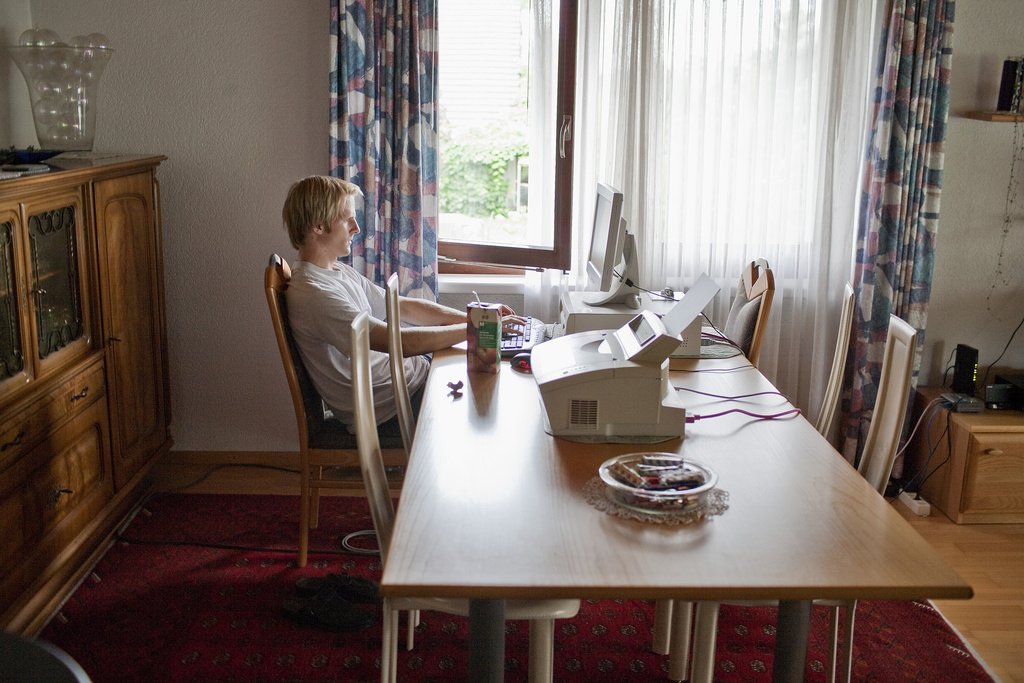Initiative encourages workers to stay at home

Some extra sleep, a leisurely breakfast and no need to leave the house – it sounds an awful lot like a lazy Saturday morning.
However, it could also be the start of a full workday for people whose jobs and employers allow them to telecommute.
May 18 is Switzerland’s first national Home Office Day. Launched with the blessing of Transport Minister Moritz Leuenberger, the idea is to give office workers some flexibility while giving the environment a break.
“I’m very convinced of the potential of telecommuting,” Leuenberger told a media conference in Bern to introduce the concept.
In April, he and his European colleagues were forced to meet via videoconference after volcanic ash from Iceland grounded planes across Europe. It turned out to be a good experience.
“Some of the other transport ministers said, ‘Why don’t we do this more often?’” said Leuenberger.
Several companies and organisations have teamed up to promote Home Office Day, among them the Swiss branch of Microsoft. The idea arose around the time of the swine flu scare.
According to Microsoft public relations manager Barbara Josef, the company decided that telecommuting would be a wise option during a public health crisis. The flu subsided, but the idea stuck.
More flexibility
The proponents of Home Office Day say that telecommuting can be a benefit for employees, employers and the environment.
“We see three areas of benefits, the first being flexibility,” Josef told swissinfo.ch. For example, the time that normally goes towards commuting can be used for family time and leisure activities – thus improving the work-life balance.
It can also relieve pressure on parents struggling to find lunchtime and after-school options for every day of the week.
The second benefit is increased productivity thanks to less background noise and fewer interruptions.
A typical office worker is interrupted 44 times a day, according to a study by Oliver Gassmann, a professor of technology management at St Gallen University.
“If I have to do something complex, like prepare an article or a presentation, then I usually do it at home because then I can decide who interrupts me,” said Social Democratic Party parliamentarian Mario Fehr, one of several politicians who supports Home Office Day.
Less waste
Gassmann’s figures show that the average employee spends 24 hours per week preparing for and sitting in meetings, many of which are ad-hoc. Working at home one day per week can eliminate up to five hours of potentially unproductive meeting time, found the study.
According to Gassmann, productivity is further enhanced because workers with telecommuting privileges are less likely to get ill or suffer from burnout; they also tend to remain loyal to the company, which means less staff turnover.
“Home office (days) increase motivation and productivity, plus concentration and creativity when the conditions are good,” said Gassmann.
Last but not least, the environment benefits when fewer people are on the road. In addition to a reduction in personal fuel consumption, telecommuting means less fuel wasted during the traffic jams that slow everyone down.
Meanwhile, the appeal of public transport increases when it is less crowded aboard peak-hour trains, buses and trams.
Guidelines are key
Despite all the potential benefits, there are some key points that are crucial to the success of a home office day.
Fehr, who is president of the Swiss Association of Commercial Employees, says that clear rules of play are a must. Important points to consider are data security and technical support, plus deciding who is responsible for providing laptops and other equipment.
Many supervisors may wonder how it’s possible to ensure that staff members are actually working when they’re at home. Josef would bounce the question right back.
“How do you control people in the office? They can just pretend to be super-busy, but instead they’re planning their holidays or shopping for shoes online. It requires a mind-shift, and that’s the most delicate part for this initiative to be successful,” said Josef.
“I think everyone can profit when there are clear terms. Getting them in writing is a good idea,” said Fehr, who suggests that specific tasks could be assigned for home office days.
Extremely satisfied
getAbstract, a Lucerne-based company that summarises business books, has allowed home office days for a long time.
“We started when people were complaining about the commute and we thought, ‘This will save us from losing them to a company in their home town’. And it worked,” said Manuela Nieth, getAbstract’s head of media relations.
As Nieth told swissinfo.ch, she works from home at least twice a week and finds it extremely satisfying.
“Even some employees who live in Lucerne are occasionally taking a home office day, simply because they find it easier to concentrate and are less distracted,” said Nieth.
Roche, the Basel-based pharmaceutical company, also supports telecommuting.
“Although not all jobs provide the opportunity to contribute from home, we experience more and more employees expressing the wish to work some time per week from home,” spokesman Alexander Klauser told swissinfo.ch.
Klauser noted that new technologies and an open-minded environment make it possible for Roche to accommodate that wish. He added that Roche benefits, too.
“It creates a win-win situation for both our employees and our company – with high motivation and satisfaction as well as high productivity,” said Klauser.
Whether or not home office days become popular in Switzerland, the idea is not to eliminate face-to-face teamwork on company premises.
As Josef emphasises, “We don’t want to send people home for good – it’s just an alternative to working in the office.”
Home Office Day estimates that half of Switzerland’s professionals are knowledge workers.
Of those, 20 per cent (ca. 450,000) could probably work from home one day a week.
Statistics indicate that each commutes about 24km per day – much of it by private transport.
If each of those people worked from home one day a week, it would prevent 67,000 tons of CO2 being released into the atmosphere each year.
1999: 4% of Swiss workers telecommute, compared with 6% of European workers
2001: 345,000 people in Switzerland occasionally work from home
2005: Europe has 16 million telecommuters, 6.3 million of whom regularly work from home
2006: 191,000 Swiss workers have telecommuting contracts
2010: Switzerland launches the first national Home Office Day

In compliance with the JTI standards
More: SWI swissinfo.ch certified by the Journalism Trust Initiative






You can find an overview of ongoing debates with our journalists here. Please join us!
If you want to start a conversation about a topic raised in this article or want to report factual errors, email us at english@swissinfo.ch.